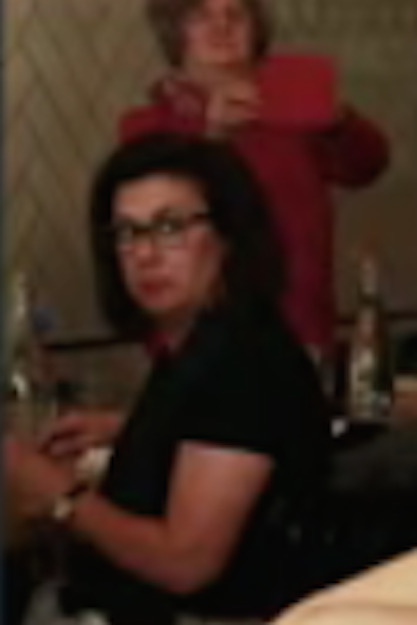Text
0 notes
Text
0 notes
Text
You're running
like you're being chased.
You're not running like
you want to cross a finish line first.
Source:
Scandal Season 2, Episode 11;
A Criminal, A Whore, an Idiot and a Liar
0 notes
Text
The truth about stolen moments...
Will:
Pete loves her.
She's his wife.
And she and I...
Well, we have what we have.
It might not be much,
but it's what we have.
Olivia:
You have nothing.
You have a pile
of secrets and lies,
and you're calling it love.
And in the meantime,
you're letting your whole life
pass you by while they raise children
and celebrate anniversaries
and grow old together.
You're frozen in time.
You're holding your breath.
You're a statue
waiting for something
that's never going to happen.
Living for stolen moments
in hotel hallways
and coat closets,
you keep telling yourself
they all add up
to something real,
because in your mind
they have to, but they don't.
They won't.
They never will.
Because
stolen moments aren't a life.
So you have nothing.
You have no one.
End it now.
Source:
Scandal Season 2, Episode 15;
Boom Goes the Dynamite.
0 notes
Link
The best part of The Daily Show - Hillary Clinton's Acceptance Speech
0 notes
Text
How can I become a coding-ninja within a year?
How can I become a coding-ninja within a year? by Reese Currie
Answer by Reese Currie:
Thanks for the A2A. I think you'll probably get some flames for the coding-ninja terminology.
It isn't completely inappropriate though, because there are certain parallels in your proposed scenario. For instance, to become a ninja master took twelve years of diligently applying yourself, day in and day out. To be a master in any complex endeavour requiring talent, including programming, takes about 10,000 hours of practice. At your projection of 2/3 hours a day (average 2.5) that'll take you about 11 years.
My serious advice? Forget about the "ninja" stuff, and forget about the "within a year" stuff. Did you ever hear the expression, "he doesn't know s--t from Shinola?" A person calling himself or herself a "coding-ninja" doesn't know s--t from shinobi. (People who know about ninjas will get that one!)
Also forget about tutorials. Buy books, especially for your first few languages. Tutorials are about getting a thin introduction to a language. A book is about going deep. If you want to be a "ninja", you're going to want to go deep.
In your first year: learn one and only one programming language. Preferably, make it an easy language, with a read-eval-print loop, and one with a nice, thick book available. If a publisher hasn't published a nice thick book for a language, it isn't worth knowing, at least not yet.
I recommend Python as a first language for people who are learning on their own. The O'Reilly Python book is a huge beast. If you really want to be a "ninja" you might start with C, but I would say leave that for your second language so you don't get too bogged down in low level details at first.
Whatever you choose, learn it extremely well. Learn it so well you can make it do whatever you can conceive of doing. Do not choose a one-trick pony language like PHP, which is for web sites and really nothing else--choose a general purpose programming language that you can use to make anything. Then make anything you want in it.
In your second year, add the second language. Yes, I would say C for the second language. Learn it as well as you learned the first language. C is a fairly small language and you will learn what it is like to code close to the hardware. It takes some time to learn well. C comes with a nice thin book: The C Programming Language by Brian Kernighan and Dennis Ritchie. Get that one. C++ is not the same thing as C. Leave it for now; it is not your #2 language.
Okay. You now have two languages under your belt, and I'm going to give very general guidelines for #3, #4, and #5. You don't necessarily have to know these as well as your first two unless you find you really like them and want to work with them. Make one of them Java, and make at least one of them a functional programming language so you can learn about that paradigm. It is also good to fit in a declarative language somewhere in your list.
A few functional languages, listed in order of "functional purity": Haskell, OCaml (F# is close to OCaml), the Lisp dialects (Scheme, Clojure, Racket, Common Lisp), and Scala.
A few declarative languages: SQL, XSLT, Prolog. You will probably need SQL at some point if you plan to do any database work.
Most people can only really be proficient in 5 languages at a time; some can stretch and do 7. That doesn't mean you can only learn 5-7, it means that you'll have a core set of five or so that you'll know better than others. If you don't know at least 4 or 5, and only know one programming paradigm, you probably shouldn't consider yourself a "ninja".
How can I become a coding-ninja within a year?
0 notes
Text
How difficult is it for the average person to become a computer programmer?
How difficult is it for the average person to become a computer programmer? by Rachel Fong
Answer by Rachel Fong:
language
If you have never coded before, I would start with Python since it's versatile, the syntax is very simple, and it's easy to get started. C/C++ for the ballsier beginners, though it'll be painful to get your very first line of code running. Perhaps Haskell/Scheme if you're a mathematician. Try Javascript if you only want to do web development. I personally wouldn't pick Javascript as a first language since it tolerates poor programming practices, which will come back to bite you.
setup
A full IDE is overkill for a beginner (they are more typical when building enterprise software). Get a simple text editor with syntax highlighting, such as Sublime Text. Don't just use Notepad. Real text editors will make your coding experience far less painful.
Start out doing simple things -- try to just print out information and manipulate data, for example printing out a fibonacci sequence. Once you know how to run simple programs, you might try free online courses like Coursera or Code Academy, or look at intro courses that universities have posted online (like MIT's OpenCourseWare).
Use Google and StackOverflow liberally. (StackOverflow is basically Quora for coding questions.)
next steps
Start thinking of little projects and coding them up for yourself. A stopwatch, a tic-tac-toe game, things like that. Working on your own projects is the most motivating way to learn.
Learn how to use the terminal. You should also learn how to use a text editor that works in the terminal, like vim or emacs.
At this point if you just want to make websites, you can skip all the following steps and start learning a web framework. Django and Ruby on Rails are the two most popular ones. There are innumerable treatises written elsewhere on their various pros and cons.
classic books that will make you better, stronger, faster
SICP Structure and Interpretation of Computer Programs by Abelson, Sussman, and Sussman. An awesome book covering many fundamental programming concepts and paradigms. It uses the Scheme language in examples.
K&R The C Programming Language by Kernighan and Ritchie. C will force you to learn some interesting concepts and become a better programmer. I'm sure this sounds bizarre to non-programmers. The gist of it is that it doesn't tolerate carelessness and exposes low-level interaction with the computer that isn't available in many of the "easier" languages, allowing you to manipulate data in interesting ways.
CLRS Introduction to Algorithms by Cormen, Leiserson, Rivest, and Stein. The standard CS bible/textbook on algorithms.
We like our acronyms. It's all about efficiency, man.
mindset & tips
This all comes to mind because I was recently deconstructing the frustrations of some noncoder friends who had taken intro programming classes. I came up with a list of helpful coding practices / ways of thinking that were intuitive to me but not at all obvious to them:
Ask dumb questions, and don't be ashamed. I'm talking questions like, What is a server? How does a variable work? How do I print in C? Just ask it. This was new to everyone at some point. Ask Google first if you don't want to ask a coder.
Persistence. Don't give up. Keep asking dumb questions until you figure it out. Ask Google, ask people, ask your computer (print statements, debugger).
Something I hear a lot is "I don't even know where to start." Ask incremental questions as well as dumb ones. Building a game? How does a video game work? Ah, it has a graphics engine. How does a graphics engine work? How do I make a graphics engine?
Sometimes you have no idea why you're getting a bug. Again, ask incremental questions given whatever knowledge you have. For example, integer overflow. Why did my very large positive number become negative?
It's valuable to know a little about computer architecture and the architecture of whatever other software you're working on top of. At least learn how registers, memory, and stacks work.
Computers are not magic. Everything happens for a reason. Yeah, it's frustrating when just recompiling changes your code's behavior. Figure out that reason. Ask yourself really obvious questions, and ask questions that have nothing to do with the code you wrote. Are these software packages even compatible? is a common culprit. Look at your evidence and trace it back to the source. Understand why it happens.
Love coding and computer science. This is not necessary, but extremely helpful in getting better at it.
How difficult is it for the average person to become a computer programmer?
0 notes
Text
Where does one start in programming?
Where does one start in programming? by @simonw
Answer by Simon Willison:
Go to this site:
http://www.codecademy.com/
And follow the interactive tutorial.
(then spend the next 10 years honing your craft, but codecademy is an excellent first step)
Where does one start in programming?
0 notes
Quote
I find myself capable of loving people so deeply that it hurts me when they're hurt, even if that pain were caused by me to save myself.
Farima Fath
0 notes
Quote
Don't ever risk your life or career for an asset. If it comes down to you or them, send flowers.
Spy Game
0 notes
Quote
Put away some money so you can die someplace warm and don't ever touch it, not for anyone. Ever
Spy Game
0 notes
Text
When This Vox Anchor Was Interviewing Justin Trudeau
Before I start this post I have to say that I tried posting this on Buzzfeed but it is just too complicated for me. I am from the GENeration-lazY, do not expect me to change pixel size and do all that, I might as well publish a paper instead of using those skills for posting a simple joke I wanna share with people on the internet. So, I come back to the love of my life: Tumblr, for all its simplicity and scalability.
When Justin Trudeau was asked to react to "Americans moving to Canada if Trump wins", he mentioned major issues Canada is facing right now and although a lot of viewers including me felt that this anchor was quite smitten by him.

There was a moment where she asks him if they can use his picture for a feminist meme.

And this lady here seemed to have read my mind.

I know. I know.

Same feels.
0 notes

